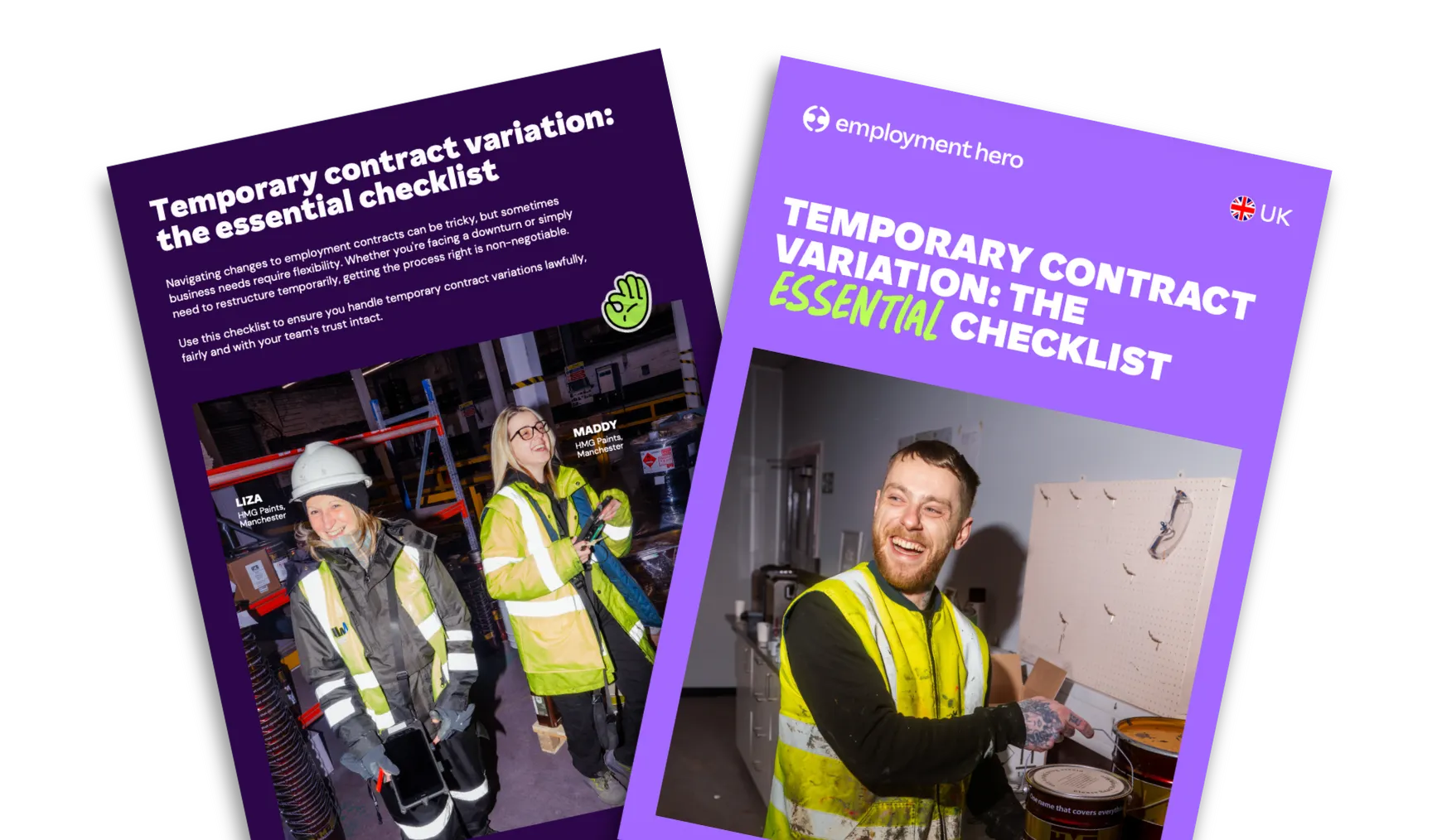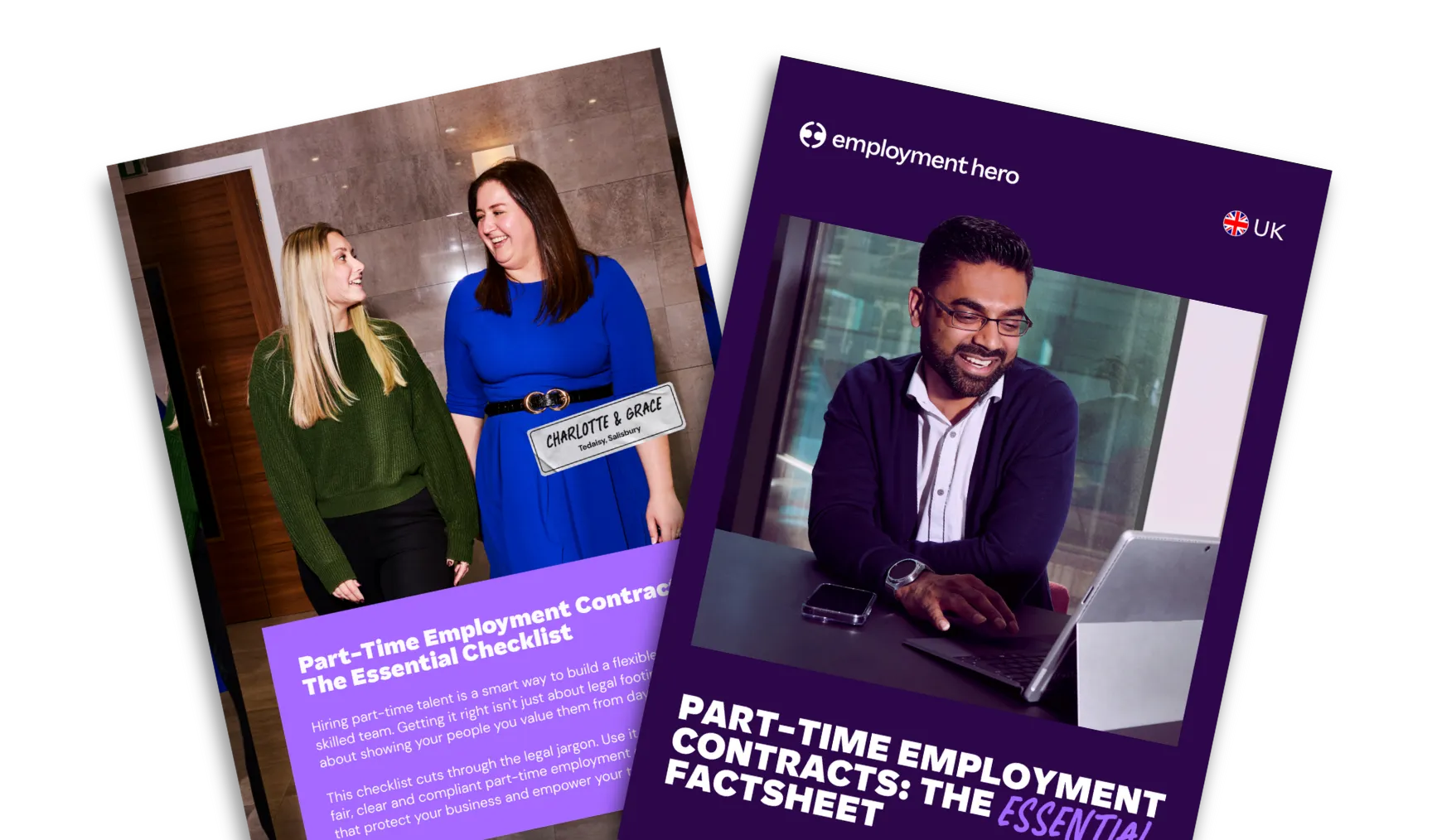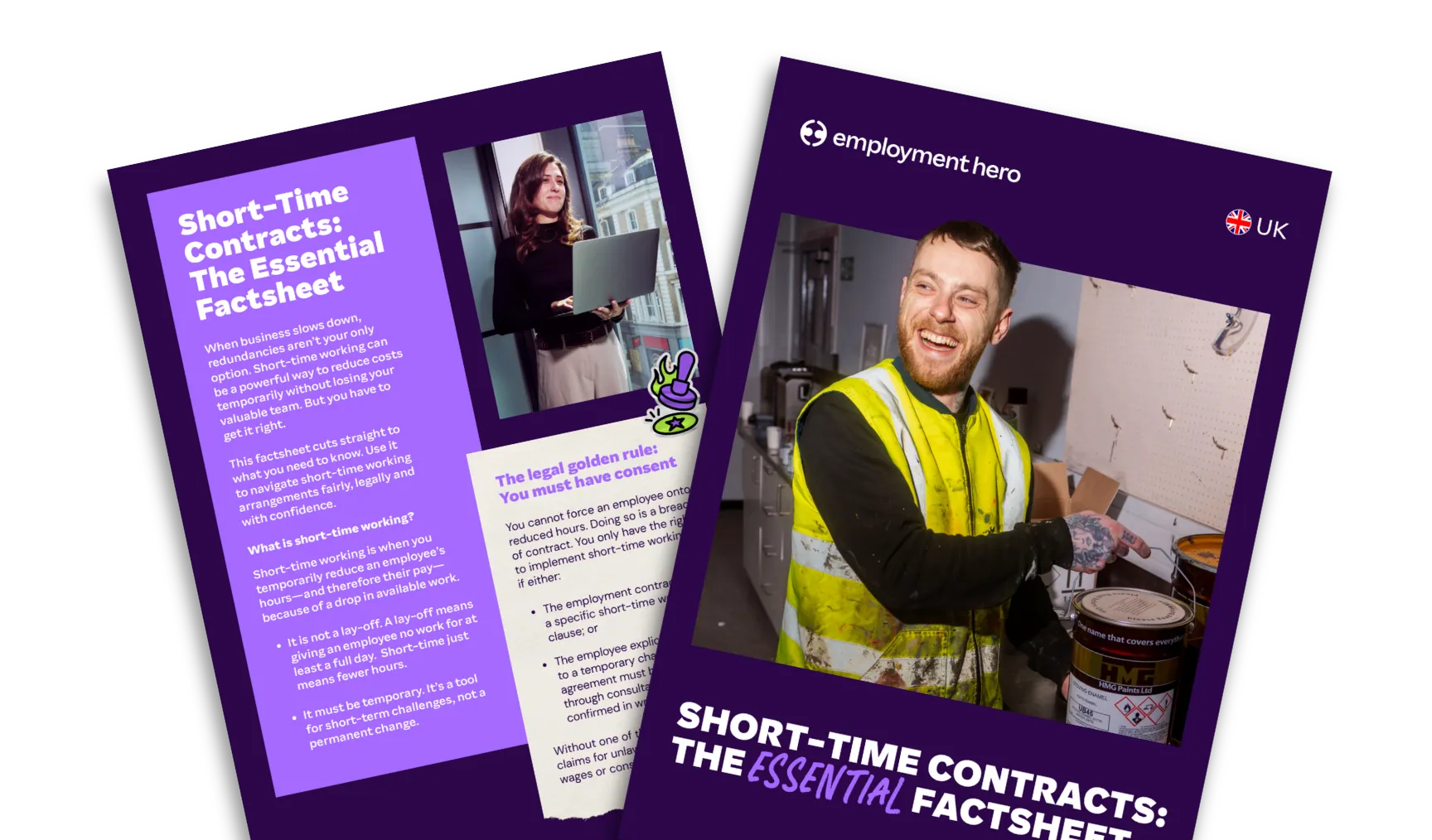Probation Extension Letter Template for Employers
Published
Probation Extension Letter Template for Employers
Published
Finding the perfect fit for your company can be tricky and you never know how someone is going to fit in until they’re in the role. This is where probation periods come in handy. But what happens when their probationary period is coming to an end and you still aren’t certain? Maybe they have the skills, but struggle with deadlines or perhaps they haven’t fully settled into the team culture. Your gut tells you they have potential, but you need more time to be sure. This is where a probation extension becomes your most powerful tool.
Handling this situation requires a delicate balance of fairness, clarity and legal compliance. You need to give your employee a genuine chance to succeed while protecting your business. We’ll break down the entire process, from understanding the legal framework to having that crucial conversation as well as providing a free downloadable and customisable probation extension letter template.
How to use this template
Our downloadable probation extension letter template is designed to make a difficult conversation straightforward and fair. Before you send it, you need to customise it to fit the specific situation. This means adding the employee’s name and position, clearly and factually stating the reasons for the extension and outlining the specific, measurable improvements you need to see. Most importantly, you must set a new review date.
Your tone should be professional, supportive and grounded in fact, not emotion. This isn’t about pointing fingers; it’s about providing a clear path forward. Adhering to UK employment law is critical and this template is your foundation for doing just that.
With that in mind, let’s step back and ensure we’re all on the same page about what a trial period is and why it matters so much.

What is a probation period?
A trial period is a fixed amount of time at the start of a new job where both you and your new employee get to test the waters. Think of it as an introductory phase. For business owners and HR professionals, it’s a chance to assess the employee’s performance, skills, reliability and cultural fit in a real-world setting. For a new employee, it’s an opportunity to decide if the role and your company are the right fit for them.
This period is a crucial part of your onboarding process. It allows you to confirm you’ve made the right hiring decision before committing to permanent employment. When the period ends successfully, the employee’s position is confirmed. If not, you might consider ending their employment or, as we’re discussing, probation extensions.
The length of this period can vary, so let’s look at what’s standard in the UK.
How long is a probation period?
There’s no one-size-fits-all answer, but most UK trial periods last for either three or six months. The length you choose often depends on the complexity of the role and your business needs.
3-month period
A three-month trial is very common, especially for entry-level or less complex roles. It provides enough time to assess a new starter’s core abilities and their initial fit with the team. It’s long enough to see patterns in performance and behaviour without feeling overly drawn out.
6-month period
For senior, specialised or more complex roles, a six-month period is often the better choice. This extended timeframe gives you a more comprehensive view of the employee’s performance across a wider range of tasks and business cycles. It allows more time for in-depth training to take hold and for the employee to demonstrate their strategic value.
Longer than 6 months
While you can set a trial period longer than six months, you should tread carefully. A trial period of 12 months, for example, might be seen as unreasonable unless you can strongly justify it based on the specific nature of the job. Unjustifiably long periods can be demotivating and may not stand up to legal scrutiny if challenged.
Regardless of the length, the trial period serves a vital function in your hiring strategy.
Why is the probationary period important?

The trial period is your safety net. It allows you to evaluate a new hire’s suitability for the role beyond what you can learn from a CV and interviews. It’s your chance to see their skills in action, observe how they collaborate with colleagues and determine if they align with your company’s values.
A well-managed trial period helps reduce employee turnover by ensuring that only suitable candidates become permanent members of your team. It protects you from the significant costs associated with a bad hire. When you get this stage right, you improve long-term hiring success and build a stronger, more committed workforce. A great trial experience is a cornerstone of any effective employee onboarding process.
To make it legally sound, you need to ensure it’s properly documented in your contracts.
What should I include about the probation period in my contracts?
Your employment contract is the legal foundation of your relationship with an employee. To make your probationary terms enforceable, you must include them in their contract.
Probation clause
Your contract must have a dedicated probation clause. This clause should clearly state that the first part of their employment is a trial period and define its length.
Probation terms
The clause should also outline the terms. This includes explaining that their performance and suitability will be monitored and that passing the probation is required to confirm their employment. You can also mention different notice periods that apply during the trial. Importantly, probation should only be considered passed once this has been confirmed in writing to the employee.
The right to extend
This is the most critical part. The contract must explicitly state that you reserve the right to implement a probation extension. Without this clause, you have no legal basis to extend it and attempting to do so could be considered a breach of contract.
Once the contract is signed, you can focus on implementing the period effectively.

How do I implement a probation period?
A successful trial period is an active, engaged process, not a passive waiting game. From day one, you need to set clear, measurable expectations. Your new hire needs to know exactly what success looks like in their role.
Schedule regular check-ins, don’t wait until the final review. These meetings are your opportunity to provide constructive feedback, celebrate wins and address any concerns before they become major issues.
Document everything. Keep notes from your review meetings, including any goals set and feedback given. This documentation is essential if you later need to justify a probation extension or dismissal. The right onboarding software can help you structure and track this process.
Throughout this time, it’s important to remember that your employee still has rights.
What are an employee’s rights during a probationary period?
Even though they are on a trial, employees are protected by UK law. They have the same statutory rights as any other employee from day one. This includes the right to:
- Be paid the National Minimum Wage.
- Receive payslips.
- Not have unlawful deductions made from their wages.
- Protection under the Working Time Regulations (e.g., limits on weekly hours and rights to rest breaks).
- Be protected from any form of discrimination.
Is there a notice period on probation?
Yes. The notice period during the trial period should be clearly stated in the employment contract. It’s common for this to be shorter than the notice period for a permanent employee.
What’s the minimum notice period during probation?
By law, after one month of continuous employment, an employee is entitled to at least one week’s notice from their employer. You can agree to a longer contractual notice period and it’s common for this to be one week from either the employee or employer during the probationary period.
Terminating an employee during probation
If it’s clear that an employee is not performing to the required standard or is otherwise unsuitable for the role, you can end their employment during their probation. However, you must act fairly and professionally.
Dismissal during probation
Your decision should be based on the evidence you’ve gathered during the review process. You need to be able to demonstrate that you gave the employee clear goals, provided feedback and offered support to help them improve. When you hold the termination meeting, be direct, respectful and clear about the reasons for your decision, referencing the performance issues you’ve documented.
Although employees with less than two years’ service generally cannot claim ordinary unfair dismissal, they may still bring claims for automatic unfair dismissal or discrimination – for example, if the dismissal relates to pregnancy, raising a grievance, or a protected characteristic under the Equality Act 2010. Employers should therefore ensure that any decision to dismiss is based on objective, well-evidenced grounds and is free from bias or discriminatory factors.
Right to appeal
While there is no statutory right for an employee to appeal a dismissal during their trial period, offering one is considered best practice. It demonstrates fairness and can help reduce the risk of a claim against your business.
But what if you’re not ready to dismiss? This is where our template comes in.
Download the probation period template
If you believe your employee has the potential to succeed but just needs more time, a probation extension could be the right move. To do it correctly, you need to formalise the decision in writing. Employment Hero’s probation extension letter template is here to help.
FAQs about probation periods
Yes, you can, but only if you reserved the right to do so in the employee’s employment contract. You must also communicate the extension and the reasons for it to the employee before their original probation period ends.
It is a formal document you give to an employee to officially inform them that their probationary period is being extended. The letter should explain the reasons for the extension, detail the specific areas for improvement, set new objectives and state the new end date for the probation.
Common reasons include:
Feeling that the employee has not yet fully adapted to the company culture or integrated with the team.
Needing more time to assess performance against specific targets
Concerns about attendance or timekeeping
There is no single piece of legislation dedicated to probation periods. Instead, they are governed by general principles of UK employment law, primarily rooted in contract law and the Employment Rights Act 1996.
Best practice dictates that the process must be fair, reasonable and contractually sound to avoid claims of breach of contract or unfair dismissal (though the latter is only available to employees with two years of service). For new hires, the bigger risk is a discrimination claim if the decision to extend is based on a protected characteristic.
Register for Downloadable
Related Resources
-
 Read more: Temporary variation of employment contracts: an employer’s checklist
Read more: Temporary variation of employment contracts: an employer’s checklistTemporary variation of employment contracts: an employer’s checklist
Learn how to manage a temporary variation of contract. Understand legal consent, documentation and compliance with employment law.
-
 Read more: Employment contracts for part-time employees: What employers need to know
Read more: Employment contracts for part-time employees: What employers need to knowEmployment contracts for part-time employees: What employers need to know
Learn how to create a legally compliant part-time employment contract in the UK. Understand worker rights, pay and leave entitlements…
-
 Read more: Short Time Contracts: What You Need To Know
Read more: Short Time Contracts: What You Need To KnowShort Time Contracts: What You Need To Know
Learn how short-time contracts work in the UK. Understand legal rules, pay entitlements and redundancy rights for compliant short-time working.



















